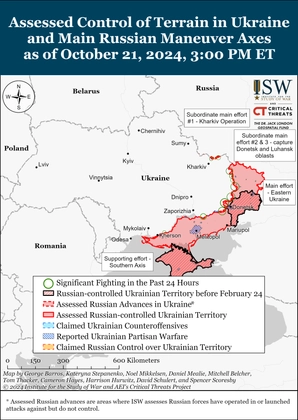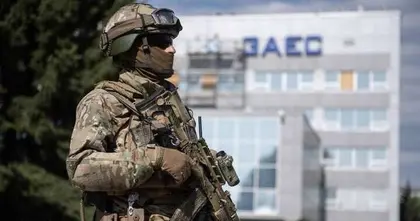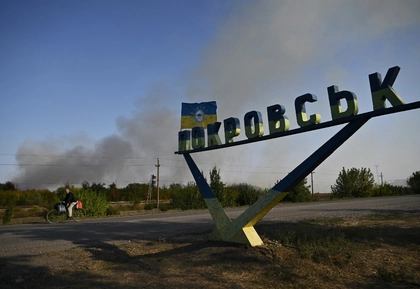Putin’s nuclear blackmail
Last week, the Kremlin’s nuclear blackmail at the Zaporizhzhia Nuclear Power Plant (ZNPP) took a new turn. The visit of the International Atomic Energy Agency (IAEA) mission to the ZNPP, led by its Director General Rafael Grossi, was preceded by long and exhausting negotiations with Russia: It was agreed that the delegation would travel exclusively through Ukrainian territory and safe corridors through the temporarily occupied areas were confirmed.
JOIN US ON TELEGRAM
Follow our coverage of the war on the @Kyivpost_official.
On the eve of the visit, Russia staged a provocation as usual, trumpeting to the entire world about some mythical landing of 60 Ukrainian soldiers, who allegedly wanted to seize the ZNPP. This would have been real political and military madness, taking into account a 3,000-strong Russian Forces (RF) garrison and the arrival of respected representatives of the international organization.
On Sep. 1, 2022, the IAEA delegation nevertheless arrived at the Zaporizhzhia nuclear power plant. It looked like a victory!
Here are the details that are difficult to explain with elementary logic, but which become clear if you analyze the entire military-political context of this visit and Russia’s powerful influence on the agency:
First, the IAEA delegation took about three days to get to the ZNPP, and spent only two hours at the station.
What could be seen during these two hours is absolutely incomprehensible. After all, specialists who are well-acquainted with the station claim that it is impossible even to cover the complex’s area during this time.

ISW Russian Offensive Campaign Assessment, October, 22, 2024
Moreover, it is practically impossible to draw adequate conclusions about the state of radiation safety. The only thing we heard from Grossi was that the integrity of the station was broken.
Two experts, who will constantly monitor the situation at the ZNPP, remained at the station but the question of their safety, and, therefore, the impartiality of their conclusions arises.
Second, despite all the assurances of Mr. Grossi, only Russian propagandists accompanied the delegation to the ZNPP. Independent Ukrainian and Western journalists were banned from entering the station by representatives of the Russian occupation forces. It is clear that under such conditions, the visit was presented only in a favorable light for the aggressor.
One of the Russian officials showed an unexploded shell, assuring that it was Ukrainian, which seemed quite symbolic: He was asked why the position of the shell indicated that it originated from the occupied territory, he suggested that it was because it changed course by 180 degrees before arrival.
No comment.
Third, we never heard calls from Rafael Grossi for the demilitarization of the ZNPP zone. This is surprising because Grossi said that he heard nearby explosions and shelling when at the station. In a photo, the entire world saw Russian military vehicles parked on ZNPP property during the entirety of the IAEA representatives’ visit.
The IAEA is a neutral organization, and therefore it is unlikely to directly accuse the Russian military of violating the radiation safety of the ZNPP. Moreover, we need to take into account the massive infiltration of Russian agents of influence into the agency’s governing bodies.
Our victory will be the IAEA’s call for the demilitarization of the ZNPP zone, and accordingly our defeat will be the recommendation to suspend the operation of the plant’s reactors, because this will lead to a shortage of electricity in Ukraine.
The situation at the nuclear plant remains critical. Ukrainian authorities are preparing for possible radiation emissions, as evidenced by the purchase of anti-radiation drugs and the regular publication of recommendations in case of any accident at the ZNPP.
There is only one way to solve the crisis – Russian troops must leave the ZNPP in particular, and Ukraine in general.
Europe limited the issuance of Russian visas
In one of his speeches, President Volodymyr Zelensky, called on the EU to stop issuing visas to Russian citizens. This caused real outrage across Russian society.
The majority of Russians, who support the so-called special military operation against Ukraine, were typically indignant. “Why us?” they asked.
A minority of Russians, nearly heroes because of their opposition to Putin’s regime, has already consciously asked the same question.
Clearly, Putin’s supporters have full responsibility for his actions, including the aggressive war against Ukraine, the destruction of Mariupol and the atrocities in Bucha.
Such people should not be permitted to travel to Europe and must stay in Russia. EU visas are not a right, but a privilege that must be earned.
A small number of regime oppositionists, so-called good Russians, fight against Putin inside the country, for example, by demonstrating against the war with Ukraine, or at least by voting against the government in elections. It is easy to be an opposition politician, drinking coffee or whiskey in restaurants in London or Paris while criticizing the Russian authorities.
The idea of limiting visas for Russians also did not arouse enthusiasm in some EU countries, especially in France and Germany where pro-Russian sentiments are traditionally strong. Other European countries are used to counting money, and, for them, Russian tourists are those who bring money. In their opinion, losing such a source of income is absolutely unacceptable.
However, a fairly active group of countries – Poland, Lithuania, Latvia and Estonia – have joined the EU. These countries, despite financial arguments, realized a long time ago that Russian citizens are the “fifth column” in the EU, an instrument of Russia’s pressure on the sovereign power of European countries and a cover for Russian special services operations. And remember the attempted assassinations of Sergei and Yulia Skrypal by supposed Russian tourists from the GRU, and the recent protests in Estonia against the demolition of a war monument.
A long and difficult discussion (this is typical for the EU) ended with a compromise in favor of Ukraine. European countries have agreed to cancel the agreement on simplified issuance of visas to Russians, to complicate this process and limit the issuance of tourist visas, and in general issue them only to oppositionists. Individual countries were allowed to provide their own, stricter visa rules for Russian citizens.
The visa battle ended in favor of Ukraine and our successive partners. Russia was significantly limited in its ability to exert political pressure through its migrants and tourists on European countries. Russian’s main intelligence agency, the GRU, is also angry because it has lost serious opportunities to cover up its illegal devices.
Russian citizens should feel in their own lives all the troubles and problems brought by Putin’s aggressive policy and realize that not only Putin will bear responsibility for the crimes committed, but also all Russian people who supported him and indulged him.
You can also highlight the text and press Ctrl + Enter






